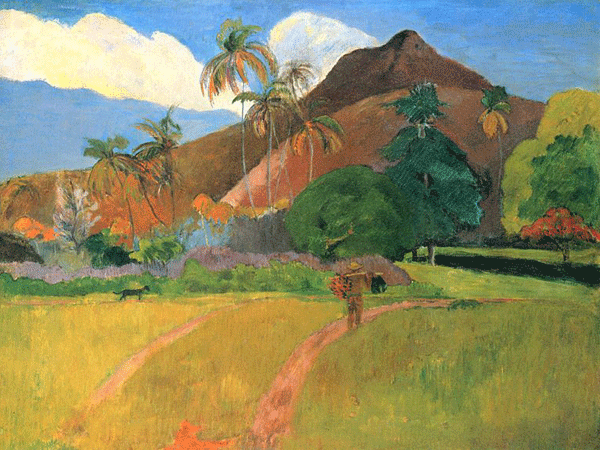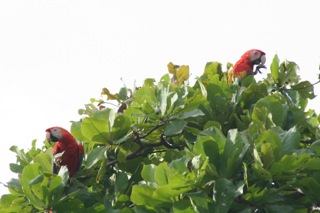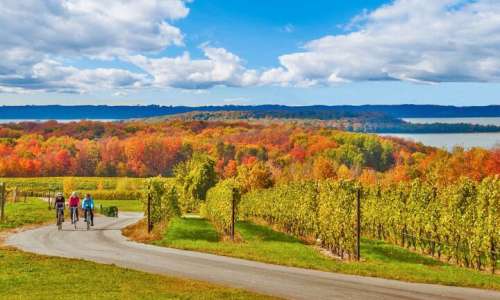 I’ve been thinking a lot about the South Pacific this week. Perhaps it’s the frost on the windshield of the car this morning forcing me to deal with Father Winter or flee to the tropics. Similar to Africa, the South Pacific is one of those places that get under your skin, coaxing you to return as often as possible. Unlike the majority of the Caribbean isles, which can only boast a white strip of sand, the South Pacific isles are jaw-dropping jagged peaks that rise straight up from the ocean, carpeted in emerald green overripe foliage. For me, this is paradise.
I’ve been thinking a lot about the South Pacific this week. Perhaps it’s the frost on the windshield of the car this morning forcing me to deal with Father Winter or flee to the tropics. Similar to Africa, the South Pacific is one of those places that get under your skin, coaxing you to return as often as possible. Unlike the majority of the Caribbean isles, which can only boast a white strip of sand, the South Pacific isles are jaw-dropping jagged peaks that rise straight up from the ocean, carpeted in emerald green overripe foliage. For me, this is paradise.
After my inaugural trip to the region in 1990, I would make the South Pacific my area of expertise, returning as often as possible. This is especially true of the French Polynesia isles, a mere two hour flight past Hawaii. Perhaps, I was fed too much Fletcher Christian as a boy and wanted to follow in the footsteps of Captain Bligh. Or maybe it was the languorous women Gauguin painted after entertaining them in his supposed House of Debauchery.
All I know is that when I first arrived on the island of Tahiti and its bustling city of Papeete, I would have been happy to be back in Boston scraping the ice off my sidewalk. There were traffic jams, pollution-spewing cars, far too many uptight Frenchmen, and tuna sandwiches at $20 a pop. If Fletcher Christian saw present-day Tahiti, he might have continued his voyage with Bligh. Their major site, The Gauguin Museum, had no original works by the artist (another ironic twist is that Gauguin’s masterpiece, Where Do We Come From? What Are We? Where Are We Going? (1897-98), is right down the road from me in Boston). Across the way, the Harrison Smith Botanical Gardens, a collection of tropical plants from around the world founded by a former MIT physics professor, was not in the least bit memorable. I wanted to get lost in the lushness of nature, not take a walk through some manicured garden.
Then my wife and I made the wise move to head to Raitea. For me, authenticity in travel often goes hand-in-hand with a solid connection to the people of that community. Within 15 minutes of paddling on a winding river that snaked through the island, we came upon a group of kids diving off a tree swing into the water. They were so excited to see us that they insisted on showing us the small thatched huts they lived in, sat us down on a mat, and served us fresh papaya from the fields behind them.
On another trip, a 16-day cruise aboard the freighter ship
Aranui brought us the Marquesas. 750 miles north of Tahiti, the Marquesas are the most remote islands in the world, farthest from any continent. Immense green mountains pierce the clouds overhead on many of the twelve islands, retaining the savage beauty that inspired Gauguin to live and be buried on Hiva Oa. A young 22-year-old sailor named Herman Melville was so enraptured with the island of Nuka Hiva that he chose to jump ship and live with cannibals rather than continue his voyage. You can read about it in his first book, Typee. One of the most stunning natural sites I’ve ever seen was the Bay of Virgins on the island of Fatu Hiva. Towering, storm-worn basalt rises from the ocean’s depth forming a v-shaped buttress that’s illuminated by the sun. In the distance, serrated ridges and impassable gorges stand as a monument to the centuries of volcanic fires that formed this fantastic landscape.
When I returned from my trip to the Marquesas, I met a couple who spent their entire honeymoon solely on the island of Tahiti. It made me want to cry. It reminds me of a backpacking trip I took to Newfoundland, where we went off the trail less than 100 yards to look straight down at a magnificent fjord. Our guide knew it was there, but unfortunately none of the other hikers did and kept on walking. My hope for creating our travel agency,
ActiveTravels.com, is to steer travelers in the right direction so they don’t spend their entire time in French Polynesia on the island of Tahiti.
 I’ve been thinking a lot about the South Pacific this week. Perhaps it’s the frost on the windshield of the car this morning forcing me to deal with Father Winter or flee to the tropics. Similar to Africa, the South Pacific is one of those places that get under your skin, coaxing you to return as often as possible. Unlike the majority of the Caribbean isles, which can only boast a white strip of sand, the South Pacific isles are jaw-dropping jagged peaks that rise straight up from the ocean, carpeted in emerald green overripe foliage. For me, this is paradise.
I’ve been thinking a lot about the South Pacific this week. Perhaps it’s the frost on the windshield of the car this morning forcing me to deal with Father Winter or flee to the tropics. Similar to Africa, the South Pacific is one of those places that get under your skin, coaxing you to return as often as possible. Unlike the majority of the Caribbean isles, which can only boast a white strip of sand, the South Pacific isles are jaw-dropping jagged peaks that rise straight up from the ocean, carpeted in emerald green overripe foliage. For me, this is paradise. 
 Fear of overcoming the language barrier is one of most common anxieties travelers face. One experience with a surly Parisian waiter who mocks your stab at French will only exacerbate the situation. Or the futile attempt to explain to your taxi driver in Bangkok the name of your hotel when he uses a vastly different alphabet. That’s why I’m downright giddy about the latest language translation apps, found in
Fear of overcoming the language barrier is one of most common anxieties travelers face. One experience with a surly Parisian waiter who mocks your stab at French will only exacerbate the situation. Or the futile attempt to explain to your taxi driver in Bangkok the name of your hotel when he uses a vastly different alphabet. That’s why I’m downright giddy about the latest language translation apps, found in  My kids weren’t too pleased to wake up at 6:30 am on summer vacation, but I wanted to be at Carara National Park at 7 am, when it opened. I knew from prior trips to the country that Carara was one of the few places to see that majestic bird, the scarlet macaw. Last time here, I heard a loud noise, only to peer up at a family of four vibrantly colored macaws. That is an image I was hoping to recreate. We arrived early and the gate was closed. In summer, Carara opens at 8 am read the sign. Screw it. The kids were already giving me grief for waking them up, so we sneaked in through the gate and started our hike. An hour later, we were covered in sweat from the sweltering rainforest humidity and had only spotted one very large Jesus Christ lizard. No macaws. We drove back to the hotel and I was bumming big time.
My kids weren’t too pleased to wake up at 6:30 am on summer vacation, but I wanted to be at Carara National Park at 7 am, when it opened. I knew from prior trips to the country that Carara was one of the few places to see that majestic bird, the scarlet macaw. Last time here, I heard a loud noise, only to peer up at a family of four vibrantly colored macaws. That is an image I was hoping to recreate. We arrived early and the gate was closed. In summer, Carara opens at 8 am read the sign. Screw it. The kids were already giving me grief for waking them up, so we sneaked in through the gate and started our hike. An hour later, we were covered in sweat from the sweltering rainforest humidity and had only spotted one very large Jesus Christ lizard. No macaws. We drove back to the hotel and I was bumming big time.  Head to the Traverse City area, a four-hour drive northwest of Detroit (or 1-hour flight from DTW), and you’ll be treated to far more than a fun frolic on a Great Lake. The autumn colors will be out in all their glory. Slow down and explore the region at a relaxed pace on bike or on two feet and you’ll find diverse terrain, from the shaded wetlands of the Grass River Natural Area to the rolling countryside of the Leelanau Peninsula to the steep dunes of
Head to the Traverse City area, a four-hour drive northwest of Detroit (or 1-hour flight from DTW), and you’ll be treated to far more than a fun frolic on a Great Lake. The autumn colors will be out in all their glory. Slow down and explore the region at a relaxed pace on bike or on two feet and you’ll find diverse terrain, from the shaded wetlands of the Grass River Natural Area to the rolling countryside of the Leelanau Peninsula to the steep dunes of  For decades, the pear-shaped island of Sri Lanka, which falls on a map just below India, was racked by violence. Then, in 2002, a negotiated cease-fire put an end to the festering civil war between the Sinhalese-dominated government and the Tamil insurgents. Today, Sri Lanka is one of the most popular destinations for Europeans but for some reason has yet to catch on with Americans. Suffice to say that it’s worth the effort to get here. Start your visit with a trip to the glorious white-sand beaches, completely deserted except for the resident blue whales, a few hundred yards away in the ocean. After relaxing, challenge yourself with the trek up the beautiful Sigiriya Rock, an ancient rock fortress, for spectacular views of the vast green countryside. Cool down in the cooler climate of Nuwara Eliya and experience the best tea you’ll ever drink at the many plantations. One should never visit Sri Lanka without heading to Pinnawela elephant orphanage, the landscape itself is enough to bring anyone to tears and the sight of the 60 or so elephants coming down to the water to drink is something you’ll never forget. Kandy is a wonderful city to stay I, home to the Buddhist Temple of the Tooth and the monkeys at Udawattakele. In Colombo, take tea at the
For decades, the pear-shaped island of Sri Lanka, which falls on a map just below India, was racked by violence. Then, in 2002, a negotiated cease-fire put an end to the festering civil war between the Sinhalese-dominated government and the Tamil insurgents. Today, Sri Lanka is one of the most popular destinations for Europeans but for some reason has yet to catch on with Americans. Suffice to say that it’s worth the effort to get here. Start your visit with a trip to the glorious white-sand beaches, completely deserted except for the resident blue whales, a few hundred yards away in the ocean. After relaxing, challenge yourself with the trek up the beautiful Sigiriya Rock, an ancient rock fortress, for spectacular views of the vast green countryside. Cool down in the cooler climate of Nuwara Eliya and experience the best tea you’ll ever drink at the many plantations. One should never visit Sri Lanka without heading to Pinnawela elephant orphanage, the landscape itself is enough to bring anyone to tears and the sight of the 60 or so elephants coming down to the water to drink is something you’ll never forget. Kandy is a wonderful city to stay I, home to the Buddhist Temple of the Tooth and the monkeys at Udawattakele. In Colombo, take tea at the